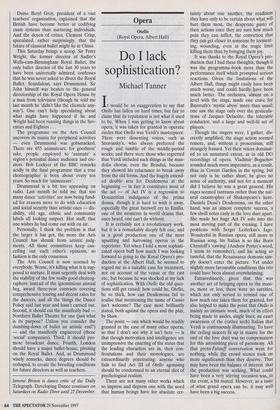Dominated by the second-rate
Ismene Brown talks to Sir John Drummond about his radio series on the crisis facing British dance
In his dark, Kensington basement flat, filled with books and beautiful earthy pot- tery, Sir John Drummond was prowling around, twitching like a large, penned-up tiger. 'Does anybody have a clear idea how to get it right?' demanded that sonorous, unmistakable voice. 'What is wrong is the almost total lack of artistic leadership, the administrative tail wagging the dog. It's a legacy of the past 20 years that the admin- istrators have been put in charge of the shop, and the artists are considered untrustworthy — as if they might run off with the takings ...'
His beef is the crisis in British dance, which Sir John (the former director of the Proms, Edinburgh Festival and Radio Three, governor of the Royal Ballet) has subjected to inquiry in a six-part Radio Three series.
Crisis? What crisis? It will come as a shock to most people. After all, the balleri- na Darcey Bussell's face is on the cover of this month's Harper's & Queen, Matthew Bourne's Swan Lake and Cinderella have seen huge success in the West End, and there is a growing procession of companies making dance for every conceivable social class and interest — these are all badges of popularity, aren't they?
But this ferocious activity is deceptive. For actually the number of people buying tickets has begun to fall, quite significantly. And Drummond's series, Developing Dance, has opened a Pandora's box of com- plaints from those within about the tide of mediocrity engulfing the art. Will it do any good? I'm not sure. For one thing, too many people dislike Drummond. A couple of critics I know are almost vitriolic about him. Yet basically they share his sense that dance has gone wrong.
But even if Sir John's recent book Speak- ing of Diaghilev (Faber, £20) reveals what a jumped-up inflatable he is (as one of them thinks), or even if he is an uncreative bureaucrat who helped put dance in the red-tape-infested mess it is in now (as the other thinks), what on earth has that to do with the force of his argument now? His survey strikes me as almost flawlessly aimed — it correctly identifies ballet's problem as a temporary loss of faith in the art itself, and modern dance's problem as the Arts Council's galloping inability to sieve good from bad. He also correctly criticises the British disease — its preference for institutions over individuals. Ironically, British dance exists thanks to the stubborn activities of artistic mavericks, 'instigators of genius', Drummond calls them, whom today's sub- sidised arts would find hard to place. (He told me that Diaghilev today would proba- bly be out on the boundaries of digital tele- vision, a combination of Cameron Mackintosh and Ted Turner.) Drummond grew up on those mavericks, when British ballet was both cutting-edge and world-renowned; when modern dance was being helped through birth by such odd midwives as the one-legged hotelier Robin Howard. There wasn't that much to see, but it was all trying hard. Thanks to sub- sidy, my generation has much more dance to go to, but too much of it is lazy and good-for-nothing. We have noticed the fever and glamour of those memoirs of the old, golden days, but we do get fed up with old folk saying nothing can be done. Drum- mond's series sets out with exemplary clari- ty how the magic vanished, but also hints how it can be got back.
Last Saturday, for instance, in the ballet programme, the former Diaghilev ballerina Irina Baronova said that watching today's ballerinas was like waiting for the kettle to boil in vain; but pinpointed their under- education, their lack of interest in the peri- od detail that brings a great classical role its contextual life. Dame Beryl Grey, president of a vast teachers' organisation, explained that the British have become better at codifying exam systems than nurturing individuals. And the doyen of critics, Clement Crisp, speculated, rather surprisingly, that the future of classical ballet might lie in China.
This Saturday brings a scoop. Sir Peter Wright, the former director of Sadler's Wells-cum-Birmingham Royal Ballet, the only ballet director of the last 30 years to have been universally admired, confesses that he was never asked to direct the Royal Ballet. Scandalous, says Drummond. Sir John himself was beaten to the general directorship of the Royal Opera House by a man from television (though he told me last month he `didn't like the clientele any- way'). One can't help speculating about what might have happened if he and Wright had been running things in the Sev- enties and Eighties . . .
The programme on the Arts Council uncovers its mania for peripheral activities — even Drummond was gobsmacked. There are 655 animateurs, for goodness' sake, people employed to `animate' a region's potential dance audience and cre- ators. Bob Lockyer of the BBC remarks acidly in the final programme that a true choreographer is born about every ten years. So much for 'animateurs'.
Drummond is a bit too appeasing on radio. Last month he told me that too many dance `activities' are now being fund- ed for reasons more to do with education and social security than artistic ones — dis- ability, old age, ethnic and community labels all looking suspect. Hot stuff, that one wishes he had come out with on air.
Personally, I think the problem is that the larger it has got, the more the Arts Council has shrunk from artistic judg- ments. All those committees keep can- celling out each other's opinions, so fashion is the only consensus.
The Arts Council is now scorned by everybody. Worse, it's killing what it is sup- posed to nurture. It must urgently deal with the stability of the few really good choreog- raphers: instead of the ignominious annual beg, award three-year contracts covering comprehensive touring and decent rates for the dancers, and all the things the Dance Policy said last year and hasn't carried out. Second, it should cut the manifestly bad Northern Ballet Theatre for one (just what is its purpose? Unless you consider the dumbing-down of ballet an artistic end?) — and the manifestly engineered (those `social' companies). Third, it should pro- mote broadcast dance. Fourth, London should have a major ballet-house, pivoting on the Royal Ballet. And, as Drummond wisely remarks, dance degrees should be reshaped, to create the breeding conditions for future directors as well as teachers.
Ismene Brown is dance critic of the Daily Telegraph. Developing Dance continues on Saturdays on Radio Three until 27 December,



















































































 Previous page
Previous page